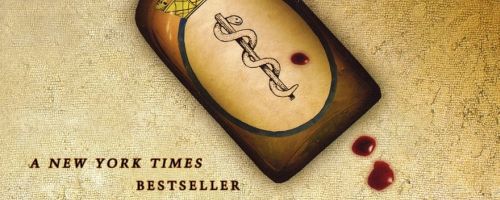

Soon, that world is upended: The Germans march into Paris and refugees flee south, overrunning Viann’s land. She returns to tending her small farm, Le Jardin, in the Loire Valley, teaching at the local school and coping with daughter Sophie’s adolescent rebellion. Cut to spring, 1940: Viann has said goodbye to husband Antoine, who's off to hold the Maginot line against invading Germans. This trajectory is interrupted when she receives an invitation to return to France to attend a ceremony honoring passeurs: people who aided the escape of others during the war. In 1995, an elderly unnamed widow is moving into an Oregon nursing home on the urging of her controlling son, Julien, a surgeon. Hannah’s new novel is an homage to the extraordinary courage and endurance of Frenchwomen during World War II.

And Ruso is a wonderful character, fueled by a dyspeptic machismo and sullen charm reminiscent of Harrison Ford in his heyday.

And in cheerful mutual insults exchanged between Ruso and his colleague and rival Valens, we hear again the effervescent voices of M*A*S*H’s Hawkeye and Trapper John. But the real achievement here is the lavishly, often hilariously detailed portrayal of the world that absorbs Ruso’s exhausted wits and energies (Downie even manages a few good jokes about English cuisine). The mystery is a good one, enriched with enigmatic images and episodes (an “invisible dog” hounding the compound, a suspicious case of food poisoning), and a secondary enigma buried in the identity and nature of the goddess whom Tilla stoically worships. The unusual suspects include bar owner (and probable procurer) Merula, sinister entrepreneur Claudius Innocens (identified, in the amusingly annotated list of “Characters” that precedes the narrative, as “a sleazebag”) and Ruso’s Uriah Heep–like nemesis, nitpicking hospital administrator Priscus. Ruso “buys” the uncommunicative Tilla and installs her as his house servant and cook, eventually gleaning from her information that suggests somebody is kidnapping freeborn girls and selling them as slaves. But these problems are trivial compared with the nightmare that builds from the discovery of a murdered slave girl’s body, then the rescue of a girl named Tilla with a broken arm evidently caused by a savage beating, then another female slave’s dead body. He’s recently divorced, overworked, at constant odds with military authorities and further burdened by demands made by his civilian brother on behalf of their financially strapped family. The title character, Gaius Petreius Ruso, is an army physician attached to a legion based in Deva (later Chester). Dark doings in Roman-occupied “Britannia” are investigated in this nifty historical mystery, the award-winning English author’s first novel.


 0 kommentar(er)
0 kommentar(er)
